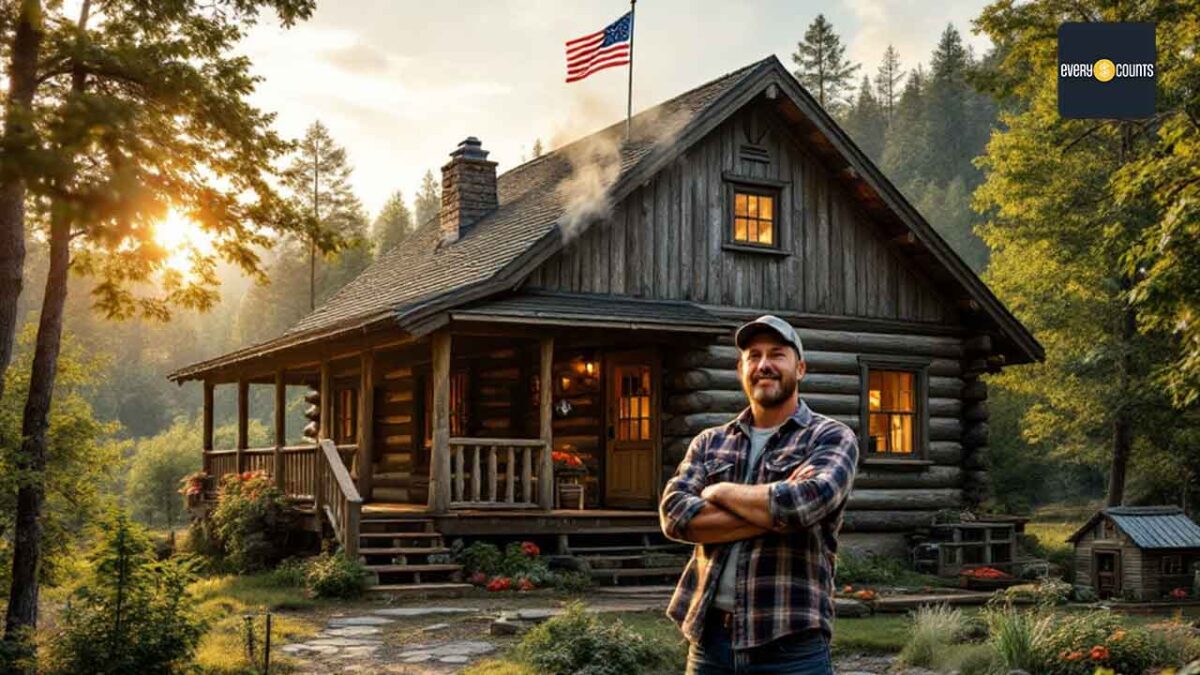Living Off the Grid in the USA: In today’s fast-paced, technology-driven world, many individuals are searching for ways to simplify their lives, reduce expenses, and connect with nature. One growing trend is off-grid living, where people generate their energy, harvest their water, and grow their food. If you’re asking, “How to live off the grid with no money?” this guide will provide practical tips and actionable advice to help you start your journey toward a sustainable, self-reliant lifestyle in the USA.
Why do people choose to live off the grid?
Living off the grid means disconnecting from traditional utilities and infrastructure. People choose this lifestyle for various reasons, including:
- Financial Freedom: Off-grid living eliminates monthly utility bills, drastically cutting living expenses in the long run.
- Environmental Sustainability: Renewable energy and sustainable practices reduce your ecological footprint.
- Self-Sufficiency: Growing your own food and producing your own energy foster independence and resilience.
With the right preparation and mindset, you can enjoy the benefits of a simpler, more fulfilling life.
Table of Contents
Step 1: Find Affordable or Free Land
The first step to off-grid living is securing land. Look for rural areas with minimal zoning restrictions and affordable property prices. Some states, such as Alabama, Tennessee, and Missouri, are known for their low cost of living and favorable conditions for off-grid living. Here are a few tips:
- Seek Land Auctions: Check local auctions or government land sales for discounted property.
- Consider Homesteading Opportunities: Some states, like Tennessee, offer programs where you can live on public land for low or no cost in exchange for maintaining the land.
- Look for Remote Areas: Rural locations often have fewer regulations and lower taxes.
Step 2: Generate Renewable Energy
Solar panels are one of the most cost-effective ways to power your off-grid home. With abundant sunshine in many parts of the USA, you can harness solar energy to run appliances, charge devices, and light your home. Here’s how to set up an energy-efficient system:
- Calculate Your Energy Needs: List all the devices you plan to use and their energy consumption to determine the size of your solar array.
- Purchase Used or Discounted Panels: Check for secondhand solar panels or government rebates to reduce upfront costs.
- Use Backup Power Sources: Combine solar power with wind turbines or a generator to ensure you have energy during cloudy days or high-demand periods.
If your budget is tight, start small with a few panels and expand your system as needed.
Step 3: Collect and Filter Water
Access to water is crucial for survival, and living off the grid means you’ll need to harvest and purify your own supply. Rainwater collection systems are an excellent solution, especially in states where rainfall is abundant. Here’s how to get started:
- Install Gutters and Barrels: Set up a system to channel rainwater from your roof into storage tanks.
- Use Filters and Purifiers: Invest in a water filtration system to ensure your water is safe to drink.
- Tap into Natural Sources: If your land has a stream or well, these can provide a steady supply of water. Be sure to test the water for contaminants.
Some states, like Colorado and Missouri, allow rainwater collection without legal restrictions, making it easier to implement this sustainable practice.
Also Read:
- First-Time Homebuyer Programs in the USA 2025-2026
- FHA Loans: Requirements, Eligibility, Interest Rates, Pros and Cons and More in 2025-2026
- How do you apply for a USDA Loan in Washington State? Tips for Success in 2025!
- If you plan to apply for a VA loan in 2025, make sure to read this!
- 20 Cheapest, Safest Places to Live in the US in 2025-2026
- How to Live Affordably in California (2025–2026)?
- 15 Best Affordable Suburbs Near Major US Cities
- 10 Most Affordable US Cities to Live in 2025-2026
Step 4: Grow Your Own Food
Food production is a cornerstone of off-grid living, and small-scale farming can significantly reduce your grocery bills. Even with minimal resources, you can grow fruits, vegetables, and raise livestock. Here’s how to start:
- Choose Low-Maintenance Crops: Focus on hardy plants like potatoes, beans, and kale that require little attention and grow well in various climates.
- Practice Companion Planting: Grow plants that support each other to maximize yields and minimize pests.
- Raise Chickens or Goats: Poultry provides eggs and meat, while goats can produce milk and clear brush on your land.
To save on costs, barter seeds or plants with neighbors, or start with heirloom varieties that allow you to save seeds for the next season.
Step 5: Build an Eco-Friendly Home
Your off-grid home doesn’t need to be expensive or extravagant. Many off-gridders opt for tiny houses, yurts, or cob homes, which are affordable and sustainable. Here are some tips:
- Use Recycled Materials: Source materials like wood, metal, and bricks from demolition sites or salvage yards.
- Insulate Properly: Good insulation will reduce energy consumption and keep your home comfortable year-round.
- Design for Efficiency: Position windows to maximize natural light and ventilation, reducing your reliance on electricity.
DIY construction is another way to save money. With online tutorials and community support, you can learn the skills needed to build your dream home.
Step 6: Embrace Low-Cost Living
To live off the grid with no money, adopt a frugal mindset and make the most of free or low-cost resources. Here are a few strategies:
- Barter and Trade: Exchange goods or services with neighbors to meet your needs without spending cash.
- Repurpose Items: Turn old tools, furniture, or containers into functional items for your homestead.
- DIY Skills: Learn basic carpentry, plumbing, and electrical work to reduce reliance on paid services.
Frugality is not just about saving money but also about building a resourceful and resilient lifestyle.

What state is easiest for off-grid living?
If you’re wondering where to live off the grid in the USA, some states are particularly welcoming to this lifestyle. Here’s a quick overview:
- Alabama: Abundant sunshine and low living costs make it a great choice.
- Missouri: Offers a balance of affordable land and a moderate climate.
- Tennessee: Known for its homesteading programs and mild weather.
- Texas: Lenient building codes and vast land availability.
- Hawaii: Perfect for tropical, off-grid living with a focus on sustainability.
Research state-specific laws and resources to find the best fit for your off-grid goals.
Do I have to pay taxes if I live off the grid?
Yes, even if you live off the grid, you are still required to pay property taxes if you own property. Property taxes are determined based on the assessed value of your land and the tax rates set by your local and state governments.
Why Property Taxes Apply to Off-Grid Living
Property taxes are a fundamental part of property ownership. Whether you live in a city or a remote area, these taxes fund essential services like schools, roads, and emergency services. Choosing an off-grid lifestyle doesn’t exempt you from this responsibility.
While living off the grid might help you reduce your dependency on external systems, certain costs remain unavoidable, including property taxes. Other expenses you may need to budget for include:
- Utilities: Even if you generate your power, you may need occasional repairs or upgrades for solar panels, wind turbines, or water systems.
- Home Maintenance: Regular upkeep for your home and infrastructure is necessary to maintain your lifestyle.
- Food and Supplies: While you might grow or hunt some food, essentials like grains, coffee, or medical supplies often require trips to stores.
- Transportation: Traveling to and from remote areas can be costly, especially with rising fuel prices.
Property Tax Exemptions: Are You Eligible?
Some individuals may qualify for property tax exemptions, which can help lower the financial burden. Common exemptions include:
- Senior Citizens: Many states offer reduced property taxes for seniors.
- Low-Income Households: Income-based exemptions are available in certain areas.
- Veterans: Some qualifying veterans receive partial or full property tax exemptions.
- People with Disabilities: Additional exemptions may apply to individuals with permanent disabilities.
- Religious or Government-Owned Properties: Properties used for religious purposes or owned by government entities are often tax-exempt.
To determine if you qualify for these exemptions, contact your local tax assessor’s office or visit their website. The application process and eligibility criteria vary by location.
Living Off the Grid: A Lifestyle of Independence, Not Tax Evasion
Living off the grid appeals to those who value independence, sustainability, and self-reliance. However, it’s important to plan for all associated costs, including property taxes, to ensure your lifestyle remains sustainable in the long term. By understanding your financial responsibilities and exploring potential exemptions, you can successfully balance the rewards and challenges of off-grid living.
Overcoming Challenges
Living off the grid isn’t without its challenges. You’ll need to adapt to a new way of life, face weather-related issues, and navigate legal regulations. However, with perseverance and planning, these obstacles can be overcome. Here are some tips:
- Stay Informed: Join online forums or local off-grid communities for advice and support.
- Prepare for Emergencies: Stockpile essentials like non-perishable food, batteries, and medical supplies.
- Understand Local Laws: Familiarize yourself with zoning codes and permits to avoid legal troubles.
By anticipating potential challenges, you’ll be better equipped to enjoy the rewards of off-grid living.
Living off the grid is not only a lifestyle choice but also a way to reclaim your independence and reduce your environmental impact. By harnessing solar power, collecting rainwater, and growing your own food, you can create a self-sustaining and cost-effective life.
For those wondering how to live off the grid with no money, the key lies in resourcefulness, frugality, and a willingness to learn. With determination and creativity, you can embrace the freedom and simplicity of off-grid living in the USA.
FAQ:
What does living off the grid mean?
Living off the grid means disconnecting from traditional utilities like electricity, water, and gas. Instead, individuals rely on renewable energy, rainwater collection, and self-sufficient practices such as farming and DIY construction.
Is it legal to live off the grid in the USA?
Yes, living off the grid is legal in the USA. However, you must comply with local building codes, zoning laws, and environmental regulations. Research your state and county rules before starting your off-grid lifestyle.
Can I live off the grid with no money?
While it’s challenging to start off-grid living with no money, it’s possible to reduce costs significantly by using recycled materials, bartering, and learning DIY skills. Look for free land opportunities, grow your own food, and rely on natural resources like rainwater and solar power.
How do I generate electricity off the grid?
You can generate electricity off the grid using renewable energy sources such as:
Solar Panels: A cost-effective and reliable option, especially in sunny states.
Wind Turbines: Suitable for areas with consistent winds.
Hydropower: Ideal if your property has a stream or river.
How do I access water off the grid?
To access water off the grid, consider these methods:
Rainwater Collection: Install gutters and storage tanks to harvest rainwater.
Natural Water Sources: Use a well, stream, or pond if available on your property.
Filtration Systems: Purify collected water to ensure it’s safe for drinking.
What type of home is best for off-grid living?
The best home for off-grid living is one that is affordable, sustainable, and energy-efficient. Common options include:
Tiny homes or cabins.
Yurts or dome homes.
DIY structures made from recycled materials like cob or straw bales.
Can I still access the internet while living off the grid?
Yes, you can use mobile hotspots, satellite internet, or other wireless solutions to stay connected while living off the grid.
Is off-grid living expensive?
While the initial setup can be costly, off-grid living becomes more affordable over time. By eliminating utility bills, growing your own food, and reducing reliance on external resources, you can achieve significant long-term savings.












